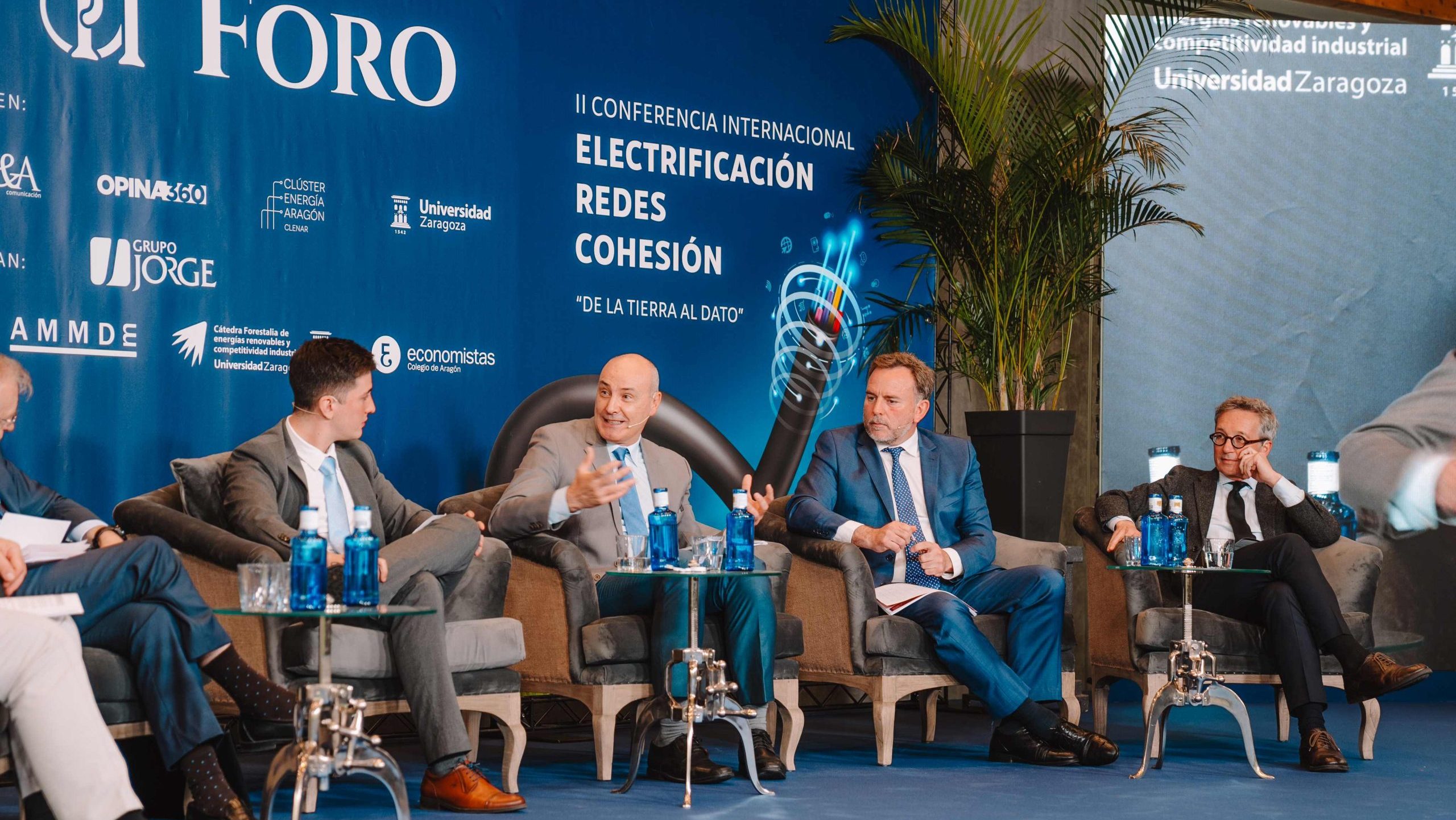Villanueva de Gállego (Zaragoza) has been the venue on May 23rd for Foro Sella 2024, an international conference that has brought together national and international experts who have spoken on aspects such as the role of Spain, and particularly Aragon, in the new environment of European energy sustainability.
Fernando Samper García, CEO of Wind and Solar Development at Forestalia, stated, “If there is energy, there will be industry, and if there is energy and industry, Aragon will grow.” “We have everything we need to succeed,” but “we cannot expect things to happen on their own.”
Samper also recalled the need to “set the conditions,” ensuring cheap and available energy through batteries and renewables and with “involvement of promoters and the Public Administration.”
In this first roundtable of the day, Pedro Machín, president of the Aragon Energy Cluster, also intervened, dedicating a few minutes to talk about pumped storage and commenting that “they are fully complementary to batteries.”
“The good thing about reversible pumping is that it’s local generation. It has a very long lifespan. We have to make them help integrate today’s renewable energies, but if in 30 years there’s another source, they should integrate that too,” he pointed out.
José Ignacio Lallana, delegate in Catalonia, Aragon, and La Rioja for Red Eléctrica, believes that “we have to make that transition seeking agreements and benefits with the territory.” The expert was emphatic, emphasizing the new planning in the transport network for 2025-2030. “We are risking a lot as a country, and we have to push it.”
José María Lassalle, former Secretary of State for the Information Society and Digital Agenda, spoke about how the design of artificial intelligence is being addressed to evolve towards sustainable or green AI. He also emphasized how Spain currently has a top-level geopolitical opportunity.
“Europe was built with the axis of prosperity North-South, but now there’s a new East-West configuration according to security,” he reflected. “Spain is in a privileged zone now, far from the military border and a Russian cold that doesn’t reach us. This reconfiguration of power relations positions us extraordinarily.”
Lassalle also highlighted that we have a powerful renewable energy industry, infrastructure development, high-capacity and low-latency fiber, powerful AI teams, and good data center facilities.
In turn, General Miguel Ángel Ballesteros, former director of the National Security department of the Spanish Government, also made some geopolitical reflections. He mentioned that the conflict in the Middle East, if escalated and Iran enters into war, can complicate things at the energy level, as “one-third of European energy passes through the Strait of Hormuz.” Therefore, he insisted on the need to seek “energy sovereignty.”
Ballesteros also spoke about how the energy security strategy, dating back to 2015, has already become obsolete, and a new one is being developed that will also include climate change. According to him, after the war in Ukraine, both aspects go much hand in hand. The new strategy will have, according to him, three pillars: supply security, sustainability, and affordability.
Aragon, a focal point of attraction
In the second debate table of Foro Sella 2024, some good practices in renewable energy management as an industrial attraction pole have been discussed. Here, major companies such as Amazon or Stellantis, which have strongly bet on the region, have intervened.
David Blázquez, responsible for Infrastructure, Energy, and Sustainability Policy at Amazon Web Services (AWS), dedicated a few words to the million-dollar agreement that the tech company has closed with Aragon and highlighted the existing talent in the region, which has allowed us “to build the brain of digitalization, constituting a European and global example.”
Ignacio Cortés, energy coordinator at Stellantis, spoke about their strategic plan for reducing energy consumption and decarbonization by 2038 and detailed how the War in Ukraine “opened their eyes” regarding seeking energy autonomy. “Spain is lucky to be an energy island, but not Poland, which had to stop production. We don’t want to be exposed to that risk again,” he assured.
Regarding the autonomous community, he commented that “Aragon is one of the best places due to its solar and wind resources and the availability of land, which allows us to boost competitiveness.”
In this second table, Carlos Manau, responsible for Industrial Refrigeration, Cogeneration, and Electricity at Bon Área, commented on how they believe in hydrogen and are participating in several consortium projects with the CDTI.
Likewise, Blanca Losada, president of Fortia Energía, has defended, like Stellantis, energy autonomy and has indicated that “it is important to adjust all obligations and objectives realistically so that they do not become an excessive burden. The operation of the sector must adapt to a new reality, and we must be agile in regulatory modification,” she concluded.
The event, promoted by the Industry and Energy Forum, CEOE Aragon, Forestalia, Opina 360, and the Aragon Energy Cluster, has been held at Hábitat Sella, in Villanueva de Gállego (Zaragoza).

